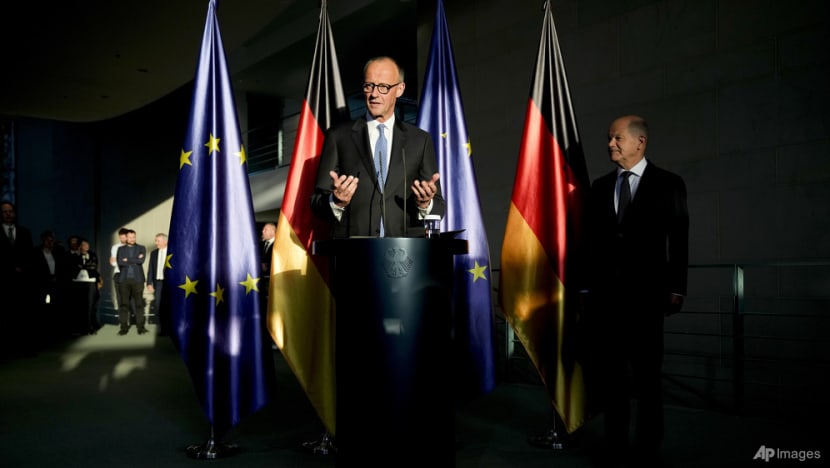German Chancellor calls for US to stay out of his country's politics

Newly elected German Chancellor Friedrich Merz (left) and former Chancellor Olaf Scholz attend a handover ceremony in the chancellery in Berlin, Tuesday, May 6, 2025. (Photo: AP/Ebrahim Noroozi)
BERLIN: Germany's new Chancellor Friedrich Merz said Tuesday (May 6) that the United States should "stay out of" his country's politics after the far-right AfD received strong backing from allies of US President Donald Trump.
Merz said "I did not interfere in the American election campaign" and that he had always felt "from America that they can clearly distinguish between extremist parties and parties of the political centre".
Earlier, the United States congratulated Germany's Friedrich Merz, who has called for greater European-led defence as President Donald Trump pulls back from the continent, and urged cooperation on security.
"We congratulate Friedrich Merz on his election as chancellor in Germany," State Department spokeswoman Tammy Bruce told reporters.
"We will continue to work with Germany and its next government to ensure the security of the United States and Europe," she said.
But only days ago, there were heated remarks by US Secretary of State Marco Rubio and Vice President JD Vance over the designation of the far-right AfD party as an extremist group.
Vance likened the move to erecting a new "Berlin Wall" against the anti-immigration party, whose leader Vance defiantly met on a visit to Germany in February.
Germany's foreign ministry hit back that the country has learned from its history "that right-wing extremism needs to be stopped".
US ROLE IN NATO & EUROPEAN DEFENCE IN QUESTION
The centre-right Merz has called for Europe to shoulder more of its own defence after Trump rattled allies by questioning whether NATO is fair to the United States and berating Ukrainian President Volodymyr Zelenskyy.
NATO chief Mark Rutte on Tuesday congratulated Germany's Friedrich Merz on his appointment as chancellor, saying he looked forward to working jointly to keep the Atlantic alliance strong.
"Your leadership will be crucial as we work to ensure that we are ready & able to deter & defend - to keep our people safe," Rutte posted on X.
But it was a wobbly start for the new German chancellor, who had signed a coalition deal with the centre-left Social Democrats (SPD) in February.
He got 325 votes in a second round, nine more than needed for an absolute majority, in the secret ballot. Merz secured just 310 votes in the first round of voting, meaning at least 18 coalition lawmakers failed to back him.
"HOPE THAT GERMANY WOULD REASSERT ITSELF"
The debacle will likely heighten mistrust between coalition partners, political analysts said, indicating a far-from-stable union at a time when Europe needs strong leadership from Germany, its largest economy.
"The whole of Europe looked to Berlin today in the hope that Germany would reassert itself as an anchor of stability and a pro-European powerhouse," said Jana Puglierin, head of the Berlin office of the European Council on Foreign Relations think-tank. "That hope has been dashed."
Merz takes office as Europe scrambles to agree on security guarantees to offer Ukraine as part of any ceasefire deal with Russia and to negotiate a trade accord with the US.
US President Donald Trump this year announced sweeping tariffs that threaten a third year of downturn for Germany, which has already had to grapple with the end of cheap Russian gas since Moscow's full-scale invasion of Ukraine in 2022 and growing rivalry from China.
The German coalition deal has mapped out plans to revive growth such as reducing a corporate tax and lowering energy prices. It also vows strong support for Ukraine and higher military spending.
On Wednesday, Merz makes his first trip as chancellor to top allies France and Poland, in a bid to show Germany is back on the world stage.
On Thursday, he will speak by phone with Trump - and could even meet him before the NATO meeting at the end of June, Merz told the broadcaster ZDF.
















